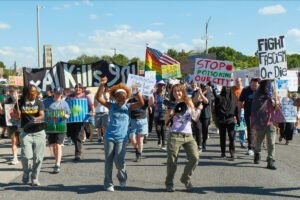
July 31, 2015; Climate Resolve
A coalition of 17 environmental nonprofits in Los Angeles is endorsing a new transit tax for the nation’s second-largest metropolitan area.
In a statement released this week, the group implores the Los Angeles County Metropolitan Transportation Authority to “prepare a transportation sales tax measure that will reduce emissions, enhance equity, incorporate green infrastructure and integrate a network of waterway trails.”
Metro’s board will be considering a transportation ballot measure in 2016 for a sales tax that will help fund additional projects in the region’s long-range plan. The proposed ballot measure will include projects and expenditures over a 30–45 year period and will produce tens of billions of dollars in revenue.
Sign up for our free newsletters
Subscribe to NPQ's newsletters to have our top stories delivered directly to your inbox.
By signing up, you agree to our privacy policy and terms of use, and to receive messages from NPQ and our partners.
The measure is viewed as complementary to a measure approved in 2008 that funded over a hundred miles of fixed-rail and bus rapid transit service serving the region. About 70 percent of L.A.’s transportation funding comes from three local sales taxes. L.A. is in the middle of a massive 50-year transit construction program that is considered the largest public works project in the US.
The group is supporting the new tax measure from an environmental perspective, saying that it “should have an explicit goal of increasing public transit and lowering drive alone trips. […] We support building a large network of public transit as an important first step in shifting the region’s transportation mode use.”
“We also believe that transportation plays a critical role in land use, public health, and environmental outcomes in the region. Metro has an opportunity not only to transform the region’s transportation system, but also to help the region reduce harmful emissions from private and cargo vehicles, make streets safer to walk and bike, connect more people to jobs and recreational places, and make green infrastructure enhancements that will help address current and future climate and drought challenges,” the open letter goes on to say.
Among the points the coalition makes in the letter, published on the website of Climate Resolve, a local advocacy organization:
- “A future transportation sales tax measure should be guided by the explicit goal of reducing greenhouse gas (GHG) emissions from the transportation sector to 1990 levels by 2020, 40 percent below by 2030, 80 percent below by 2050. Preference should be given to transportation projects that reduce GHG or are GHG neutral. California is a national leader on climate change legislation, but the transportation sector is the State’s largest GHG emitter—air quality can be improved with greater investment in public transit and strategies to boost transit ridership, encouraging transit oriented development, implementation of congestion reduction initiatives, reduction of vehicle miles traveled, and expansion of multimodal transportation.”
- “Funding should be targeted to the most impacted communities in the county, many of which are disadvantaged and heavily impacted by localized air pollution from highway traffic. Transportation equity—having equitable access to quality, affordable transportation options; sharing the benefits and burdens of transportation system investments; and being engaged in the planning process—is critical. A majority of transit riders are people of color whose median incomes are below the county’s median. In L.A., low-income communities and communities of color are exposed to the highest rates of transportation-generated pollution.”
- “The region’s urban river corridors are strategically located to serve as key non-vehicular transportation routes and provide a green infrastructure network, so a comprehensive plan for implementation of a Los Angeles basin-wide active transportation network should include a waterway network of trails.”
- “Metro should amend its ‘Green Construction Policy’ to incorporate integrated water management features, such as storm water runoff capture and management, as well as permeable surfaces into the design and construction of all rail, bus rapid transit, arterial or highway improvements. This will have an added benefit of addressing California’s historic drought. Transportation construction should also mitigate impacts on natural habitats.”
As one might imagine, there are many voices looking to be heard on the issue. However, lawmakers from both parties agree that the tax is woefully out of date.—Larry Kaplan











